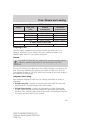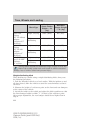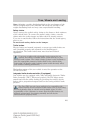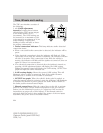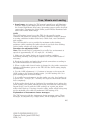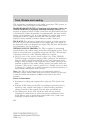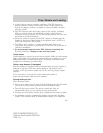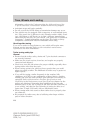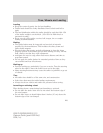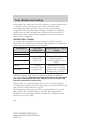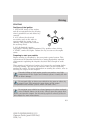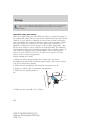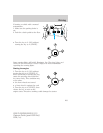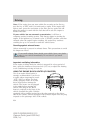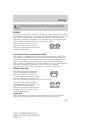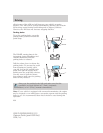
Loading
• Keep the center-of-gravity low for best handling.
• Trailer loads should be evenly distributed front to back and left to
right.
• The load distribution within the trailer should be such that 10%–15%
of the trailer weight is on the hitch. (15%–25% for fifth-wheel or
gooseneck towing.)
• Never exceed truck, trailer, receiver, ball, tongue, tire or coupler
loading recommendations.
Braking
• The trailer brakes must be inspected and serviced at intervals
specified by the manufacturer. This includes the shoes, drum and
trailer brake magnets.
• Electric brakes also require periodic adjustment to keep the shoes
properly spaced. If the brakes get hot when driving or if they will not
hold, chances are that they need adjustment.
• Anticipate the need to stop; allow much more distance and time to
stop than normal.
• Do not apply the trailer brakes for extended periods of time as they
can overheat and lose effectiveness.
Backing up
• Practice backing up, particularly if you are a novice. Turn the steering
wheel to the right to move the trailer’s rear end to the right.
• Sharp steering movements may cause the trailer to jackknife or go out
of control.
Tires
• All trailer tires should be of the same size, and construction.
• Select tires that meet the trailer loading requirements.
• Always check tow vehicle and trailer tire pressure before towing.
Launching or retrieving a boat
When backing down a ramp during boat launching or retrieval,
• Do not allow the static water level to rise above the bottom edge of
the rear bumper.
• Do not allow waves to break higher than 6 inches (15 cm) above the
bottom edge of the rear bumper.
2008 F-250/350/450/550 (f23)
Owners Guide (post-2002-fmt)
USA (fus)
Tires, Wheels and Loading
229



